Analytics, Baltic States – CIS, Economics, Financial Services, GDP, Latvia
International Internet Magazine. Baltic States news & analytics
Friday, 19.04.2024, 10:32
FinMin notes increasing risks to Latvia's growth in 2015
 Print version
Print version |
|---|
In structuring the 2015 budget, the government has foreseen the negative impact of the geopolitical events on the economic growth of Latvia, reducing the GDP growth projection for the next year.
At the moment, Latvia's GDP is predicted to increase 2.8% next year. The Bank of Latvia President Ilmars Rimsevics has said though that this is a very optimistic forecast and that economic growth could rather be closer to 2%.
Jarockis stressed that the Finance Ministry's experts were following the developments and would act accordingly if necessary.
The steep reduction in the value of the ruble over the past several days may make the economic situation worse in one of the largest export markets of Latvia, which may pose a risk to Latvia's growth. However, a lot has been happening the past few days, and it is currently impossible to predict how Russia will react to the devaluing currency, and what measures it will take. Therefore any speculations about the possible effect of the developments in Russia on the economy of Latvia are very approximate at best.
The falling value of the ruble will have the greatest impact on exporters and transport companies that specialize in shipments to Russia. The number of Russian tourists traveling to Latvia is also likely to fall, which means that tourism and related industries will also suffer. But again, it is hard to predict right now how much this could hurt Latvia, and the effect may be very different depending on industry and companies' ability to find new markets, the Finance Ministry explains.
After the financial crisis in Russia in 1998, Latvian exporters began to expand into other markets, mostly in the European Union. As a result, the effect of the Russian crisis on the Latvian economy was comparatively mild, and it was overcome quickly. However, economic growth in the EU at the time was also much faster than now, notes the Finance Ministry.








 «The Baltic Course» Is Sold and Stays in Business!
«The Baltic Course» Is Sold and Stays in Business!

